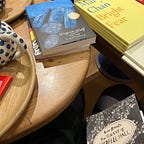The Confounding Ending of Villette
The ending of Villette is one of the most notable elements of the novel that distinguishes it quite firmly from Jane Eyre, but then again, the final page of Jane Eyre is equally unexpected, in a sense, so perhaps Charlotte Brontë’s endings are what distinguish her so superbly from other novelists in general. Charlotte Brontë initially wanted to conclude Villette with the definite death of M. Paul at sea, but her father asked her that she may at least leave it ambiguous, for he himself disliked it when novels ended sadly. For this reason, Charlotte leaves the curious element of question at the end of the novel. The striking description of the terrorizing storm that seized the Atlantic has just concluded when Lucy Snowe draws back, and for perhaps the first time in the novel, she seems to smile upon the reader.
Here pause─pause at once. There is enough said. Trouble no quiet, kind heart; leave sunny imaginations hope. Let it be theirs to conceive the delight of joy born again fresh out of great terror, the rapture of rescue from peril, the wondrous reprieve from dread, the fruition of return. Let them picture union and a happy succeeding life…Farewell!
Much to Reverend Patrick Brontë’s imagined dismay, however, the scholarly consensus has overlooked this masterful conclusion and has largely simplified it to a tragedy, in which M. Paul is dead, and Lucy is left empty. I wholeheartedly refute this claim. It took me a day or two to begin to recover from this conclusion that Charlotte Brontë strikingly yielded, and a couple of Jane Austen novels later, I have triumphantly reached full recovery, to where I can now look back and see the true mastery of this bittersweet conclusion, where the reader is left speechless, having counting on vibrant joy, clear as day, the same way Lucy was.
I will begin to explain this through another passage from the sixth chapter of the novel, illustrating the “think what you want, reader” fascinating motif that is one of the most noticeable initial differences between Jane Eyre and Villette. We pointedly and purposefully do not know Lucy’s whole story.
It will be conjectured that I was of course glad to return to the bosom of my kindred. Well! the amiable conjecture does no harm, and may therefore be safely left uncontradicted. Far from saying nay, indeed, I will permit the reader to picture me, for the next eight years, as a bark slumbering through halcyon weather, in a harbour still as glass — the steersman stretched on the little deck, his face up to heaven, his eyes closed: buried, if you will, in a long prayer. A great many women and girls are supposed to pass their lives something in that fashion; why not I with the rest?
Picture me then idle, basking, plump, and happy, stretched on a cushioned deck, warmed with constant sunshine, rocked by breezes indolently soft. However, it cannot be concealed that, in that case, I must somehow have fallen overboard, or that there must have been wreck at last. I too well remember a time — a long time — of cold, of danger, of contention. To this hour, when I have the nightmare, it repeats the rush and saltness of briny waves in my throat, and their icy pressure on my lungs. I even know there was a storm, and that not of one hour nor one day. For many days and nights, neither sun nor stars appeared; we cast with our own hands the tackling out of the ship; a heavy tempest lay on us; all hope that we should be saved was taken away. In fine, the ship was lost, the crew perished.
Immediately you wonder to what extent this metaphor conceals her trials, she tells us to picture her here─she intentionally does not make it abundantly clear the trials she has experienced and instead leaves us with a bold and poignant description of a tragic shipwreck. There is an underlying iciness and lack of intimacy between Lucy and the reader, throughout the novel and through this relationship, the ending demonstrates another key interwoven element of the text: the complexities of love.
The initial dear companionship between Graham and Polly, the heartbreaking scene when he turns her away at his birthday celebration and Polly, a young girl, begins to realise the complexities within love, and Lucy explains to her that it is not for lack of love, but rather for the complexity of it that she has found herself hurt. Lucy’s love for Graham is one of the most gutting themes and writings of the entire novel, and the ceremonial burning of his letters strikes the reader to the bone. Lucy’s romance with M. Paul is tremendously described and so much is said indirectly, that the reader feels it so poignantly, beckoning the confounding and indescribably impactful conclusion. But the conclusion presents love yet again. It shows Charlotte Brontë’s love for her father, in changing to the conclusion, trumping her own pain and intention to write of her own luckless love that she likely wished to portray. Here, the wise Patrick Brontë allowed for another element of Lucy’s character to be uncovered: her love for the story and the reader, and love for the memory of life full of love. She is left with a different sort of love, hanging aloft, and shown in the freedom and transience, which is often concealed in her own character, but with which she softly concludes, as if to utter the final words to the reader in a gentle whisper.
